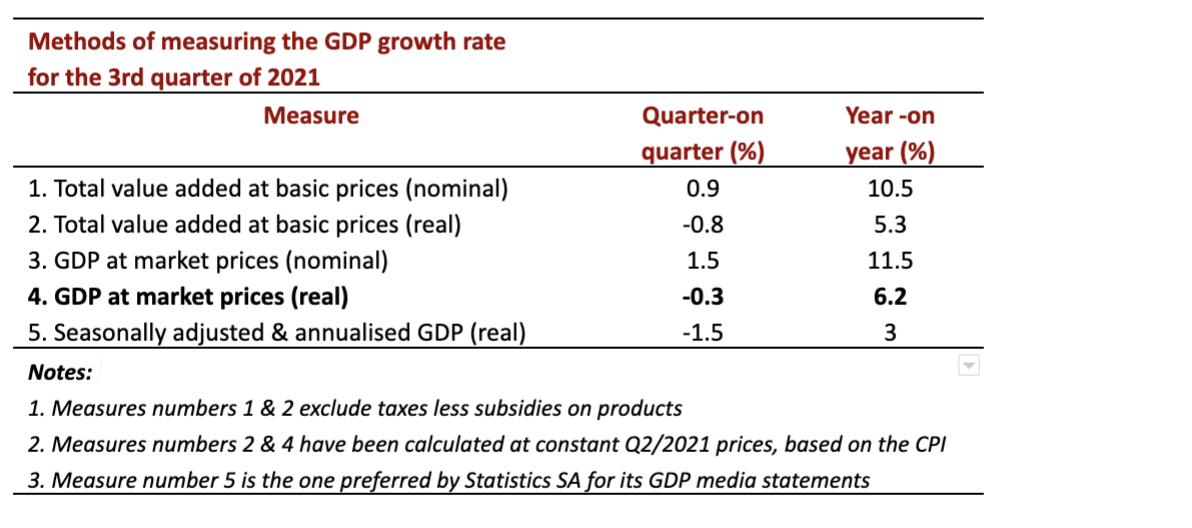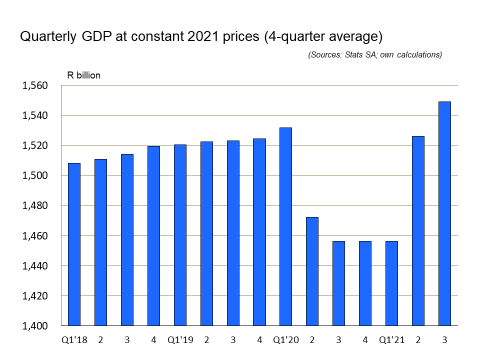The statement that the South African economy contracted by 1.5% during the third quarter is misleading, as this figure has been subjected to a calculation of quarterly GDP data that has been annualised and adjusted for inflation via a variety of deflators.
When following the good advice contained in the Glossary of Statistical Terms published by the Organisation for Economic Cooperation & Development (OECD), namely, to simply calculate real quarterly GDP growth rates on a year-on-year basis, deflated by a benchmark deflator such as the consumer price index (CPI), a much rosier picture of the South African economy emerges.
During the third quarter, total economic output at market prices amounted to R1,566-billion. The figure for the same quarter in 2020, adjusted by the CPI, was R1,474-billion. This represents a healthy real growth rate of 6.2% – not half bad when considering the devastation caused by looters in parts of KwaZulu-Natal and Gauteng in July.
In nominal terms, the year-on-year growth rate was a very impressive 11.5%.
The table illustrates the substantial difference between the growth rate calculation that is always highlighted by Stats SA and the one recommended by the OECD (measure #4, printed in bold).
Two significant advantages of using year-on-year comparisons of quarterly GDP data rather than a quarter-on-quarter approach are, first, the avoidance of magnifying irregular economic phenomena, such as harvesting seasons for agriculture and chance events such as a natural disasters or a health pandemic.
Second, it obviates the need for complicated formulae aimed at eliminating seasonality. As such, the year-on-year approach is more objective.
Justification for a belief that the economy did not contract meaningfully during the third quarter is provided by several key indicators, including the following:
- It is abundantly clear from the 2021 Medium-Term Budget Policy Statement that government’s taxation revenues have outperformed February’s budget estimates by a considerable margin. Tax revenues are, in virtually all instances, directly and indirectly correlated with some form of economic activity, especially value-added, consumption expenditure and labour remuneration.
- Total salaries and wages amounted to R714-billion in the third quarter of 2021, an increase of 2.4% in real terms over the figure for the same quarter last year. Labour remuneration represents more than 50% of value added in the economy and, with South Africa’s very high consumption propensity, this growth rate should be highly correlated with the growth of GDP.
- Wholesale sales, which represents more than 40% of GDP, increased by 5.3% in the third quarter of 2021 (quarter-on-quarter), and by almost 11% year on year (in real terms).
- South Africa’s leading business cycle indicator reached a new record high in May 2021, and the September reading of 125 was 13% higher than the figure for a year earlier.
There is no doubt that the South African economy underperformed during the third quarter, mainly as a result of the July unrest. It is disingenuous, however, to create the impression that economic activity is in decline when exactly the opposite is true, as vividly illustrated by the increase in the four-quarter moving average for quarterly GDP to a new all-time record high (in real terms). BM/DM
[hearken id=”daily-maverick/8881″]


















 Become an Insider
Become an Insider
Here Dr Botha states that SA four-quarter moving average GDP is at a new all-time high? This is not true as StatsSA themselves make clear and the data also makes clear. StatsSA has 2016 3rd quarter GDP was the same as 3rd quarter 2021. The 4 quarter average of the last four quarters is still under R4,5 trillion but SA GDP was higher thanR4,5 trillion in 2017, 2018 and 2019. So unless an all-time high starts in the 2nd quarter of 2019 then the good Dr Botha is wrong. Anyone can go see for themselves here.
http://www.statssa.gov.za/publications/P0441/P04413rdQuarter2021.pdf See table ! or table 4 or table 6 or table 8 or table 9.
I do not think SA is totally down and out, but Covid, riots load shedding, water outages, truck blockades, corruption have not helped this economy much. I do think it is good to take on StatsSA sometimes but in this case, there is no need. They are right and Dr Botha is dead wrong.
I know hundreds of jokes about economists. Let’s start the match.